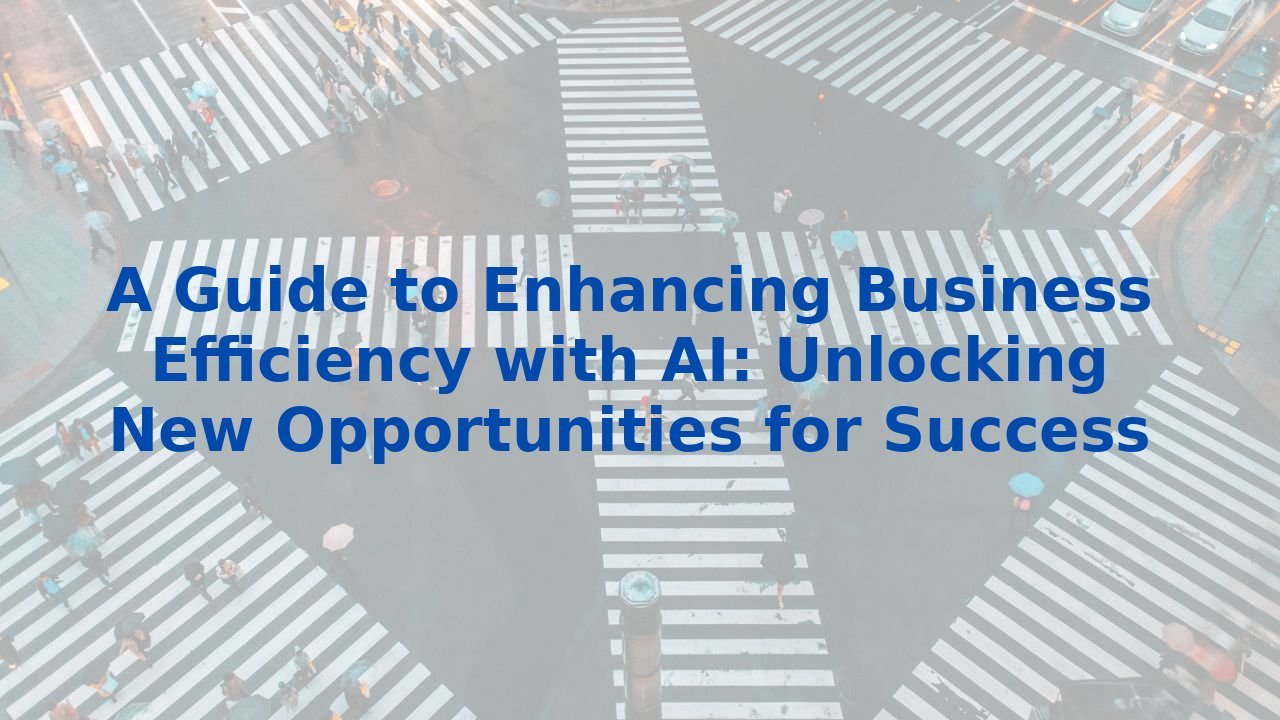A Guide to Enhancing Business Efficiency with AI: Unlocking New Opportunities for Success
A Guide to Enhancing Business Efficiency with AI: Unlocking New Opportunities for Success
In an era where every moment counts and innovation drives competition, businesses must leverage technology to stay ahead. Artificial Intelligence (AI) has emerged as a catalyst for transformation, offering organizations a pathway to enhance operational efficiency and unlock untapped potential. This guide explores how AI can revolutionize conventional business processes, creating a ripple effect of success throughout an organization.
Automating Routine Tasks
Consider the mundane yet necessary tasks that consume valuable employee time—data entry, invoice processing, and email sorting. These functions, while essential, can drain creativity and strategic thinking. Enter AI automation. By implementing AI systems to take over these repetitive chores, organizations can vastly reduce human error and accelerate workflow. Employees are liberated to focus on tasks that require intellect and insight, driving innovation rather than stagnation.
Data Analysis and Insights
Data is the lifeblood of any organization. It's not enough to gather information; businesses must analyze it effectively to derive actionable insights. AI dramatically enhances this process, sifting through colossal volumes of data faster and more precisely than any human could. By harnessing these analytical powers, businesses can pinpoint trends and identify inefficiencies, laying the groundwork for informed decision-making that optimizes resource allocation and improves overall performance.
Predictive Analytics
AI’s prowess goes beyond understanding the present; it also forecasts the future. By analyzing historical data, AI algorithms can predict demand patterns, optimize inventory management, and even anticipate maintenance needs. This foresight minimizes operational inefficiencies and informs strategic planning, allowing businesses to allocate resources where they are most needed, reducing costs while remaining agile in a competitive marketplace.
Process Optimization
At the heart of AI's value proposition lies its ability to refine processes. By investigating workflows, AI identifies bottlenecks, redundancies, and areas of wasted effort. With this critical intelligence, organizations can streamline operations, tackle inefficiencies, and implement practical solutions that elevate productivity. This new focus not only speeds up task completion but also contributes to a more financially sound operational framework.
Continuous Monitoring and Optimization
As we pursue operational excellence, continuous monitoring becomes essential. AI systems offer real-time insights, enabling businesses to make immediate adjustments as needed. For instance, AI-driven sensors in manufacturing can detect anomalies before they escalate into costly downtime. By harnessing this continuous feedback and optimization loop, organizations can maintain peak efficiency and quickly adapt to changing circumstances.
Personalized Customer Experience
In today’s competitive landscape, customer experience is paramount. AI’s capability to analyze extensive datasets allows organizations to tailor services to individual preferences and behaviors. By understanding what customers want and providing personalized experiences, businesses can significantly enhance satisfaction and foster loyalty. When customers feel understood, they are likely to keep returning, translating into long-term success.
Quality Control and Assurance
A robust quality control mechanism ensures that products meet rigorous standards. AI enhances this process by monitoring production in real-time and flagging any defects or irregularities. By catching issues during manufacturing rather than after, businesses can enhance product quality, decrease waste, and protect their brand’s reputation—all critical to maintaining customer trust and satisfaction.
Risk Management and Supply Chain Optimization
Understanding risks and opportunities in market dynamics is fundamental for any organization. With AI’s analytical capabilities, businesses can gain visibility into potential vulnerabilities and predict trends by analyzing complex relationships within large datasets. This enables proactive risk mitigation and encourages agility in decision-making. Additionally, AI can streamline supply chain operations by predicting demand fluctuations, optimizing inventory, and improving logistics, ultimately driving efficiency and cost savings.
The Benefits of Training Your Employees for AI
While AI offers tremendous tools and insights, the human element remains vital. Training employees to effectively leverage AI technologies brings many benefits:
- Enhanced Productivity: As routine tasks are automated, employees can engage in higher-value work that requires creativity and problem-solving.
- Improved Decision-Making: AI equips employees with the data necessary to make better-informed decisions, enhancing their agility and strategic acumen.
- Adaptability and Innovation: A workforce familiar with AI fosters a culture of innovation, allowing businesses to thrive in continuous improvement.
Conclusion
AI is not just a trend; it's a transformative force that can redefine efficiency in business operations. From automating mundane tasks to delivering personalized experiences, AI streamlines processes and enables organizations to make smarter, faster decisions. The investment in AI technology, coupled with a commitment to employee training, paves the way for new paths to growth, innovation, and enduring success. Embracing AI could be the key that unlocks your organization's full potential in a world eager for improvement and advancement.
To explore more about empowering your workforce with AI skills, consider visiting Complete AI Training for insightful resources and training options tailored to enhance organizational efficiency.



